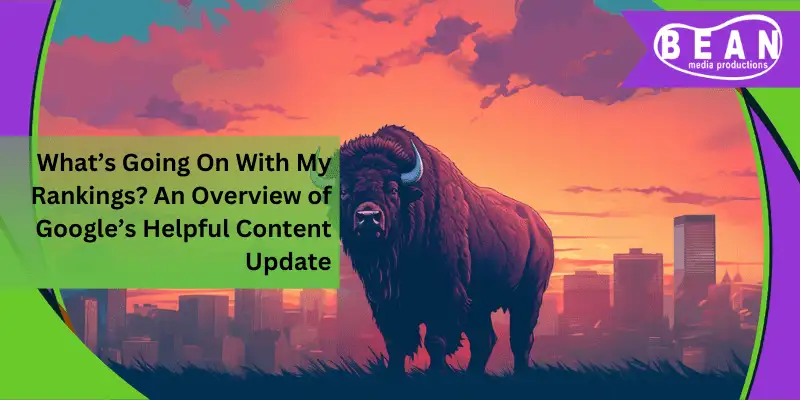A few weeks ago, Google began rolling out the Helpful Content Update. This update has one major goal on Google’s Search Engine Results Pages (SERPs) that you may have experienced. Read on to learn more about this recent update!

What Is the Helpful Content Update?
The Helpful Content Update (HCU) is Google’s latest deployment in its ever-increasing desire to deliver relative content to its users. The main objective is to down play content that was written primarily for the search engine and secondarily for the actual person reading it. Meanwhile, uplifting content that’s written for people first.
In short, this update aims to push high-quality, relevant, custom content. Google wants to reward content that is useful and helpful. Content written for the robot crawlers first has been lampooned online for some time, and Google took notice of this. People were getting fed up with content that was simply unhelpful but ranked well anyway.
What Kind of Content is Impacted by the Helpful Content Update?
Google gave us some insight into this as well before the update was rolled out. No specific corners were targeted, however some forms of content will be impacted more than others. These would include online educational materials, arts and entertainment, shopping/e-commerce, and tech-related.
Search Liason at Google, Danny Sullivan took to Twitter to discuss what Google meant by online education. His response:
“Generally tutorial, things meant to teach something, not really formal courses. But again, it’s not focused on any particular area. That’s just one example where we see notable improvement but there are others and any query about any thing might benefit”
What Will I See as A Result of the Helpful Content Update?
You may or may not see your rankings move up or down as a result of the update. If your content is helpful and unique, you had nothing to worry about. If your content is cookie-cutter material amalgamated from other sources with no original input, then you’d see the big changes.
It’s also worth noting that the helpful content update is a sitewide update, meaning that if your site does have unique and helpful material, it will suffer if too much content isn’t. Google wouldn’t elaborate further on the split the search giant considers too high and subject to deranking.
If your website suffers as a result of the recent update, don’t worry too much! Google has given a set of questions you need to ask yourself and honestly answer about your website. However, since Google had decided your content was unhelpful, it can take months for it to trust your website again and for your rankings to rebound.
If you’ve experienced derankings on Google after this update, get in touch with a digital marketing firm that excels in creating high-quality, custom content. Learn more about what we do by browsing some of our popular topics of discussion and previewing our services. And remember, partnering with a firm can be both cheaper and higher-quality than having one, in-house marketing “guru”!
How to Write User-Focused Content and Avoid Robot-Focused Content
Writing People-Focused Content
These are the questions Google laid out for creating content with the human reader in mind:
- Do you have an existing or intended audience for your business or site that would find the content useful if they came directly to you?
- Does your content clearly demonstrate first-hand expertise and a depth of knowledge (for example, expertise that comes from having actually used a product or service, or visiting a place)?
- Does your site have a primary purpose or focus?
- After reading your content, will someone leave feeling they’ve learned enough about a topic to help achieve their goal?
- Will someone reading your content leave feeling like they’ve had a satisfying experience?
- Are you keeping in mind our guidance for core updates and for product reviews?
Avoid Writing Content for Search Engines First
That leads us to the next question: what should you be asking yourself to avoid writing and producing search engine-focused content? Google has these questions to ask yourself on that topic:
- Is the content primarily to attract people from search engines, rather than made for humans?
- Are you producing lots of content on different topics in hopes that some of it might perform well in search results?
- Are you using extensive automation to produce content on many topics?
- Are you mainly summarizing what others have to say without adding much value?
- Are you writing about things simply because they seem trending and not because you’d write about them otherwise for your existing audience?
- Does your content leave readers feeling like they need to search again to get better information from other sources?
- Are you writing to a particular word count because you’ve heard or read that Google has a preferred word count? (No, we don’t).
- Did you decide to enter some niche topic area without any real expertise, but instead mainly because you thought you’d get search traffic?
- Does your content promise to answer a question that actually has no answer, such as suggesting there’s a release date for a product, movie, or TV show when one isn’t confirmed?
What Do I Do If My Website Is Impacted?
How Google flags and classifies content will be constantly updated to better fit their users. If your site has been hit with plummeting rankings, you’re going to need to develop a plan to prove to Google that your content is no longer being written for the robots. That plan is going to need to include creating content that is being produced for the person that’s going to see it.
Also, you may not have seen swings reminiscent of the 2012 Panda update yet, but as new Core and other Google updates are released, don’t be surprised if/when those come if you do have low-quality, scraped content. Just because your site wasn’t caught up in this rollout, doesn’t mean it can’t be in a future one. Danny Sullivan took to Twitter again to say,
“Maybe the helpful content signal alone wasn’t enough to tip the scales and produce a change in someone’s particular situation, but when we do other updates (core, product reviews) it might add into that and be more significant.”

Sullivan went on to say that not every site is going to be affected by the update. He questions “Why would that happen? Are the majority of sites unhelpful?” This is a fair assessment, Google has been trying to achieve pushing more quality content for a while. If a plethora of websites found themselves sinking like an anchor, that would be a bad look for the search engine. The implication being too many websites it had atop SERPs were unhelpful.
Connect with the World!
Bean Media Productions is a full-service digital marketing firm located in Buffalo, NY! But don’t let that fool you, we have clients all over! Our boutique digital marketing agency gives each of our clients the individual attention and service they deserve. We have a proven track record of success in growing business with search and digital advertising (and PPC!), SEO, graphic design, content marketing, conversion rate optimization (CRO), video production and editing, and so much more.
Be Seen online. Be Heard by your prospective customers. Grow With Us here at Bean Media!
Stay up to date with our blog, you’ll regularly get some free basic internet marketing advice, updates on what’s what in our little corner of the world, and more! You can also check out our Facebook, YouTube and Instagram pages for a more detailed picture of who we are and what we do.
Are you ready to launch your digital presence into the stratosphere? Give us a call or fill out our online contact form today. We can’t wait to grow your business!


